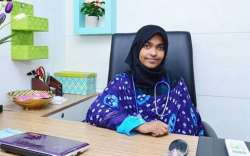Kerala ‘love jihad’ case: Supreme Court allows Hadiya to continue with her medical studies; next hearing in Jan 2018
Kerala woman Hadiya, who grabbed the headlines over the love jihad controversy, appeared before the Supreme Court on Monday to present her side of the argument on her alleged forced conversion to Islam.

The Supreme Court on Monday directed the medical college in Salem to allow Hadiya, the Kerala woman who grabbed the headlines over the love jihad controversy, to continue with her internship, and also provide her with the hostel facility.
The three-judge bench headed by Chief Justice Dipak Misra allowed her to continue studying for BHMS. It directed the university concerned to re-admit Hadiya and grant her hostel facility while also appointing the Dean of the Salem-based homeopathic college as her local guardian.
The top court said that dean of the college can apprise the court in case of any untoward situation. "I should be considered a human being. I want to be a good citizen," Hadiya told the Supreme Court.
The apex court asked the Kerala police to provide the young woman with security and ensure she travels to Salem at the earliest.
The top court also directed that Hadiya will neither stay will her husband nor her parents, but will stay in the medical college till the hearing is completed. It also fixed the next date of hearing in the third week of January 2018.
Asked about her views on her marriage, Hadiya told the top court that she wants her freedom to decide on what she has to do, adding that she wants to meet her husband.
When CJI Dipak Misra asked her if she wanted to continue her studies on state’s expenses, Hadiya said that she wanted to continue her medical studies, but on state’s expense as her husband Shafin could take care of her.
Kapil Sibal, appearing for Shafin, told the Supreme Court that Hadiya has the right to decide over what she wants, adding that the court should listen to her and not the NIA.
On this, the counsel for Hadiya’s father said, “Initially material submitted by NIA should be looked into, and then she should be talked to. There's an operational apparatus existing for conversion”.
Following the arguments between the two sides and Hadiya's testimony, the top court sent Hadiya
Earlier, the National Investigation Agency (NIA) submitted a 100-page probe report in the case before the apex court.
Hadiya, alias Akhila Ashokan, had married a Muslim man Shafin Jahan without her family consent last December. Her father had approached the Kerala High Court in May this year alleging in his petition that Shafin had trapped her daughter and had forcefully converted her to Islam for Islamlic radicalisation.
On the other hand, Hadiya, on November 25, said that nobody forced her to convert to Islam. “I am a Muslim. I want to go with my husband. Nobody forced me to convert,” she said.
Also Read: Kerala ‘love jihad’ case: No one forced me to convert to Islam, want to go with my husband, says Hadiya
Shafin Jahan, Hadiya’s Muslim husband, had moved the apex court after the Kerala High Court had annulled his marriage.
Shafin had, on October 30, filed a complaint alleging that attempts were being made to reconvert her to Hinduism ahead of her being produced in the top court.
The apex court on October 30 had directed Hadiya's father, Asokan to present her in the court on November 27 to ascertain her views on her marriage to Shafin Jahan.
The court in the last hearing had said that before examining the latter issue, it would like to ascertain if Hadiya had voluntarily converted to Islam and her views on her marriage.
The court is hearing a plea by Shafin Jahan challenging the Kerala High Court order of May nullifying his marriage with Hadiya and seeking recall of its order asking the National Investigation Agency (NIA) to investigate the conversion of Hadiya to Islam and her marriage.
The NIA claims there is a "well-oiled machinery working in Kerala" which indulged in indoctrination and radicalisation of women, and has cited 89 such cases from the state in its report.
The NIA in its earlier report has pointed to a "pattern" involving conversion to Islam and marriages in Kerala, an extension of the right-wing 'love jihad' allegations made across the country.